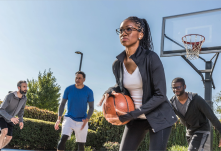Campaign Kit: Sports Eye Safety
Protecting your employees' well-being is a top priority. Encouraging proper eye protection during sports and recreational activities can significantly reduce the risk of serious eye damage for your employees. No employee eye injuries mean your company reduces the risk of productivity loss.
Download, Copy, and Share
Select and copy the ready-to-use text. Or, click and download the image you want to use and save it to your computer. Then post on your internal social media, emails, or intranet.
Social Content
Heads Up! Sports are a blast, but eye injuries can sideline the fun. Encourage your friends and family to wear proper eye protection during games and activities. Get more info.
#VisionCare #EyeSafety #EmployeeWellness
Email & Web Content
Playing sports is a great way to get active and incorporate exercise into your day. Whether you're an adult participating in a sports league or have a child who plays sports at school, don't forget to protect your eyes while being active.
There are more than 600,000 sports-related eye injuries that occur each year, and 1/3 of these injuries occur in children. The good news? Most of these injuries could be prevented by wearing the appropriate protective eyewear. Even though protective eyewear plays such a big role in keeping eyes safe while playing sports, only 15% of children report wearing eye protection while playing sports.
Let's take a look at the common eye injuries that may occur and how you (and your eye doctor) can keep your eyes protected.
Sports Eye Injuries
The type of injury and sports eye protection you need will depend on the sport you play. Common sports eye injuries include:
- Blunt trauma to the eye, such as a hockey puck or baseball hitting your eye. This type of injury may lead to an eye socket fracture or other vision threading issues, such as a detached retina.
- Penetrating injuries, such as a finger, ice chip, or even a fishing hook entering the eye can also occur. These injuries may cause punctures to the eyeball or corneal scratches.
- Sun damage such as photokeratitis, which occurs after unprotected exposure to UV rays and causes a "sunburn" on your eyes, while skiing, doing water sports, or other outdoor activities.
Types of Sports Eyewear Protection
There are many different products out there to help children and adults keep their eyes safe while playing sports. Here are some tips:
- Choose the right type of eye protection. Different sports come with different eye injury risks, so choose your eyewear based on your activity. For example, The Vision Council recommends wearing sports goggles if you play basketball, soccer, squash, or tennis; face shields or guards if you play football, hockey, or lacrosse; cycling eyewear if you bike; and swimming goggles if you play water polo or swim.
- Check the standards. When selecting sports eye protection products, make sure they meet impact standards for the American Standards for Testing and Materials (ASTM) and that they fit properly to ensure maximized protection.
- Talk to your eye doctor. Your eye doctor can help you choose the best eye protection for you and your child. They'll help you choose the right products and ensure they fit correctly. Plus, if you need glasses to see near and/or far, they can help you find sports protective eyewear and the right prescription.
What to Do When a Sports Eye Injury Occurs
If an eye injury occurs while playing sports, take immediate action and seek care from an ophthalmic eye care provider or medical professional. Protect the eye from further trauma (if you can) by shielding it with a cloth. If foreign debris is in the eye, flush it out with water, but don't wash your eye if there's a puncture or cut. If an object is stuck in the eye, don't remove it, as this can cause further damage.
Keep Your Eyes Safe and Healthy
Whether you have vision correction needs or not, your eye doctor can help you keep your eyes safe while playing sports. Schedule an appointment with an eye doctor today to get your eyes checked and discuss any day-to-day concerns, like your sports eyewear protection needs.
Information received through VSP Vision Care channels is for informational purposes only and does not constitute medical advice, medical recommendations, diagnosis, or treatment. Always seek the advice of your eye doctor, physician, or other qualified health provider with any questions you may have regarding a medical condition.

